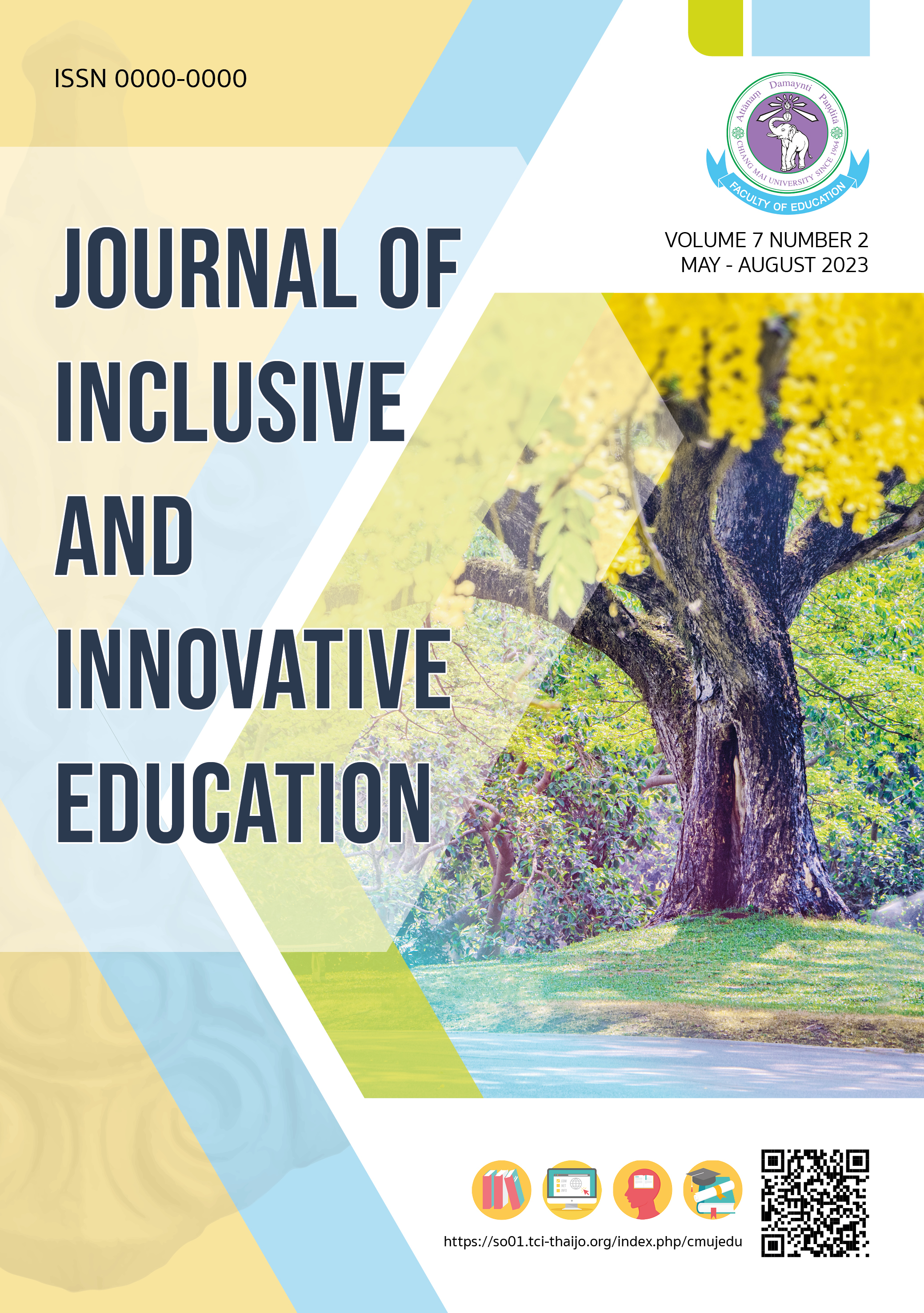ผลการสืบเสาะหาความรู้โดยใช้ประเด็นทางสังคมที่เกี่ยวเนื่องกับวิทยาศาสตร์เป็นฐาน เรื่อง ชีวิตในสิ่งแวดล้อม ที่มีต่อการตั้งคำถามของนักเรียนชั้นมัธยมศึกษาปีที่ 4
Main Article Content
บทคัดย่อ
การจัดการเรียนรู้แบบสืบเสาะหาความรู้โดยใช้ประเด็นทางสังคมที่เกี่ยวเนื่องกับวิทยาศาสตร์ เป็นการจัดการเรียนรู้ที่เปิดโอกาสให้นักเรียนได้ลงมือปฏิบัติจริงโดยมุ่งเน้นให้นักเรียนได้เห็นความสำคัญของการประยุกต์ใช้วิทยาศาสตร์ในชีวิตประจำวัน กระตุ้นความสนใจของนักเรียนให้เกิดการตั้งคำถามและนำไปสู่การสำรวจตรวจสอบเพื่อหาคำตอบของคำถามนั้นๆ งานวิจัยนี้มีวัตถุประสงค์เพื่อศึกษาการตั้งคำถามของนักเรียนชั้นมัธยมศึกษาปีที่ 4 ที่เรียนรู้ด้วยการจัดการเรียนรู้แบบสืบเสาะหาความรู้โดยใช้ประเด็นทางสังคมที่เกี่ยวเนื่องกับวิทยาศาสตร์ เรื่อง ชีวิตในสิ่งแวดล้อม กลุ่มที่ศึกษา คือ นักเรียนชั้นมัธยมศึกษาปีที่ 4/1 จำนวน 40 คน ของโรงเรียนมัธยมศึกษาขนาดใหญ่ในอำเภอชุมแพ จังหวัดขอนแก่น การศึกษาครั้งนี้ใช้รูปแบบการวิจัยเชิงคุณภาพ ข้อมูลวิจัยเก็บรวบรวมจากแบบบันทึกการตั้งคำถาม แบบสะท้อนการตั้งคำถาม การบันทึกวิดิทัศน์ระหว่างที่จัดการเรียนรู้ และการสัมภาษณ์แบบไม่มีโครงสร้างและข้อมูลเหล่านี้นำมาวิเคราะห์เนื้อหา ผลการศึกษาพบ นักเรียนสามารถพัฒนาการตั้งคำถามจากประเภทการตั้งคำถามที่ไม่นำไปสู่การสำรวจตรวจสอบเป็นคำถามที่นำไปสู่การสำรวจตรวจสอบเมื่อเสร็จสิ้นการจัดการเรียนรู้ คำถามที่นำไปสู่การสำรวจตรวจสอบที่พบมากที่สุด คือ คำถามประเภทสำรวจ คำถามแบบพรรณนา และคำถามแก้ปัญหา ตามลำดับ สามารถสรุปได้ว่า การจัดการเรียนรู้แบบสืบเสาะหาความรู้โดยใช้ประเด็นทางสังคมที่เกี่ยวเนื่องกับวิทยาศาสตร์ช่วยส่งเสริมการตั้งคำถามที่นำไปสู่การสำรวจตรวจสอบเกี่ยวกับสถานการณ์ปัญหาสิ่งแวดล้อมได้ นอกจากนี้การตั้งคำถามยังมีส่วนผลักดันให้เกิดความฉลาดรู้ด้านสิ่งแวดล้อมซึ่งกระตุ้นให้นักเรียนรู้จักแสวงหาข้อมูล คาดการณ์ และพัฒนาคำตอบโดยใช้ใช้ความรู้เกี่ยวกับสิ่งแวดล้อมเพื่อตอบคำถามอีกด้วย
Article Details

อนุญาตภายใต้เงื่อนไข Creative Commons Attribution-NonCommercial-NoDerivatives 4.0 International License.
หากผู้เสนอบทความมีความจำเป็นเร่งด่วนในการตีพิมพ์โปรดส่งลงตีพิมพ์ในวารสารฉบับอื่นแทน โดยกองบรรณาธิการจะไม่รับบทความหากผู้เสนอบทความไม่ปฏิบัติตามเงื่อนไขและขั้นตอนที่กำหนดอย่างเคร่งครัด ข้อมูลของเนื้อหาในบทความถือเป็นลิขสิทธิ์ของ Journal of Inclusive and Innovative Education คณะศึกษาศาสตร์ มหาวิทยาลัยเชียงใหม่
เอกสารอ้างอิง
Aflalo, E. (2018). Students generating questions as a way of learning. Active Learning in Higher Education, 22(1), 63-75.
Ariza, M.R., Christodoulou, A., van Harskamp, M., Knippels, M.C.P.J., Kyza, E.A., Levinson, R. et al. (2021).
Socio-scientific inquiry-based learning as a means toward environmental citizenship. Sustainability, 13(20), 11509.
Chin, C. (2002). Open Investigations in science: Posing problems and asking investigative questions. Teaching and Learning, 23(2), 155-166.
Chin, C. & Brown, D.E. (2002). Student-generated questions: A meaningful aspect of learning in science. International Journal of Science Education, 24(5), 521-549.
Chin, C. & Osborne, J. (2008). Students’ questions: A potential resource for teaching and learning science. Studies in Science Education, 44(1), 1–39.
Crawford, B.A. (2014). From inquiry to scientific practices in the science classroom. In N.G Lederman & S.K. Abell (Eds.). Handbook of research on science education. Abingdon: Routledge.
Easton, P. (2014). Sustaining literacy in Africa: Developing a literate environment. Paris: The United Nations Educational.
Evendi, Susantini, Wasis, & B K Prahani, B K. (2018). Improving students’ scientific asking skills through the implementation of question webs based learning model. Journal of Physics: Conference Series, 1108 01203.
Green, A. & Baek, J. (2022). Developing student outcomes for environmental literacy in K-12 education. Retrieved from https://www.noaa.gov/sites/default/files/2022-09/NOAA_BWET_ELE_Layout_Final_PDFUA _Accessible.pdf
Henderson, J. B., MacPherson, A., Osborne, J., & Wild, A. (2015). Beyond construction: five arguments for
the role and value of critique in learning science. International Journal of Science Education, 37(10), 1668–1697.
Hofstein, A. Navon, O., Kipnis, M., & Mamlok-Naaman, R. (2005). Developing students’ ability to ask more
and better questions resulting from inquiry-type chemistry laboratories. Journal of Research in Science Teaching, 42(7), 791-806.
Hollweg, K.S., Taylor, J.R., Bybee, R.W., Marcinkowski, T.J., McBeth, W.C. & Zoido, P. (2011). Developing a framework for assessing environmental literacy. Washington D.C.: North American Association.
Jituafua, A. (2018). Developing questioning skills of science student teachers using ice balloon inquiry
activity and cognitive coaching in the class of learning management skills for a subject-specific area. Journal of SWU Sci, 34(1), 187-205. [in Thai]
Krajcik, J., McNeill, K. L., & Reiser, B. J. (2008). Learning–goals–driven design model: Developing curriculum
materials that align with national standards and incorporate project–based pedagogy. Science Education, 92(1), 1–32.
Lederman, J. S., Lederman, N. G., Bartos, S. A., Bartels, S. L., Meyer, A. A., & Schwartz, R. S. (2014).
Meaningful assessment of learners’ understandings about scientific inquiry-The views about scientific inquiry (VASI) questionnaire. Journal of Research in Science Teaching, 51(1), 65–83.
Levinson, R. (2018). Introducing socio-scientific inquiry-based learning (SSIBL). School Science Review, 100(371), 31-35.
Lombard, F. E., & Schneider, D. K. (2013). Good student questions in inquiry learning. Journal of Biological Education, 47(3), 166–174.
Miftahuddin, M. Roshayanti, F., & Siswanto, J. (2023). Profile of environmental literacy students of SMPN 3 TELUK KERAMAT. Indonesian Journal of Education, 3(1), 44-54.
North American Association for Environmental Education. (2021). K-12 environmental education: Guidelines for excellence. Retrieved from https://eepro.naaee.org/resource/k-12-environmental-education-guidelines-excellence.
Nesseth, N. M., Henson, A. M., & Barriault, C.L. (2021). A framework for understanding the nature of questions asked by audience participants at science cafés. Frontiers in Education, 21(6), 674878.
Office of Natural Resources and Environmental Policy and Planning. (2013). Policies and plans to promote and maintain quality National Environment 1997-2016. Bangkok: ONEP. [in Thai]
Office of Natural Resources and Environmental Policy and Planning. (2017). The environmental situation in the country. Journal of Environmental Quality Situation, 1(2), 1-7. [in Thai]
Office of the Basic Education Commission. (2008). Indicators and core learning content. Bangkok: The Agricultural Cooperative Federation of Thailand. [in Thai]
Osborne, J. (2014). Scientific practices and inquiry in the science classroom. In N.G. Lederman & S.K. Abell (Eds.). Handbook of research in science education. (pp. 579–599). Abingdon: Routledge.
Patton, M.Q. (1999). Enhancing the quality and credibility of qualitative analysis. Health Services Research, 34(5), 1189-1208.
Ponlamas, S., & Sawangmek, S. (2021). The development of context-based-learning with argumentation for
promoting students’ environmental literacy in natural resources and environment for 10th grade students. Journal of Education Naresuan University, 23(3), 315-327. [in Thai]
Saad, M. I. M., Baharom, S., Mokshien, S. E., & Setambah, M. A. B. (2017). The study of used socio - scientific issues (SSI) in biology. International Journal of Academic Research in Business and Social Sciences, 7(3), 348-355.
Srimahunt, K., & Intana, J. (2016). The teaching integrated with authentic reflection for the students to care for the human mind. Ratchaburi: Praboromarajchanok institute. [in Thai]
Tanak, A. & Hanuscin, D. (2021). When is asking questions a science practice?. Science and Children, 59(2), 78-81.
Weiss, I. R., & Pasley, J. D. (2004). What is high-quality instruction?. Educational Leadership, 61(5), 24-28.
Zeidler, D. L. & Nichols, B. H. (2009). Socioscientific Issues: Theory and practices. Journal of Elementary Science Education, 21(2), 49-58.


